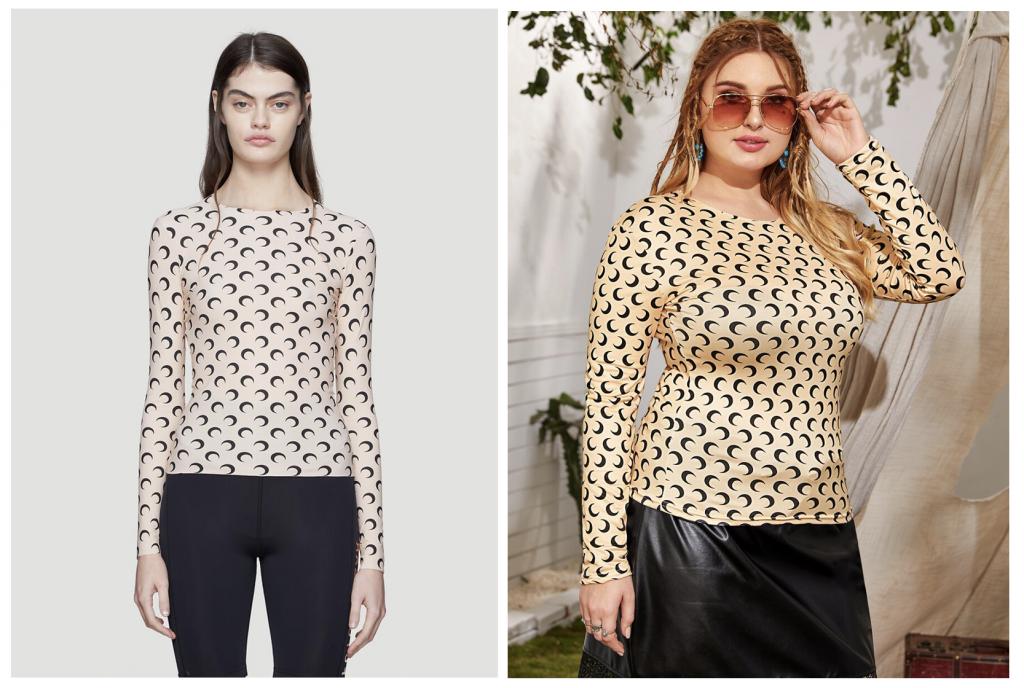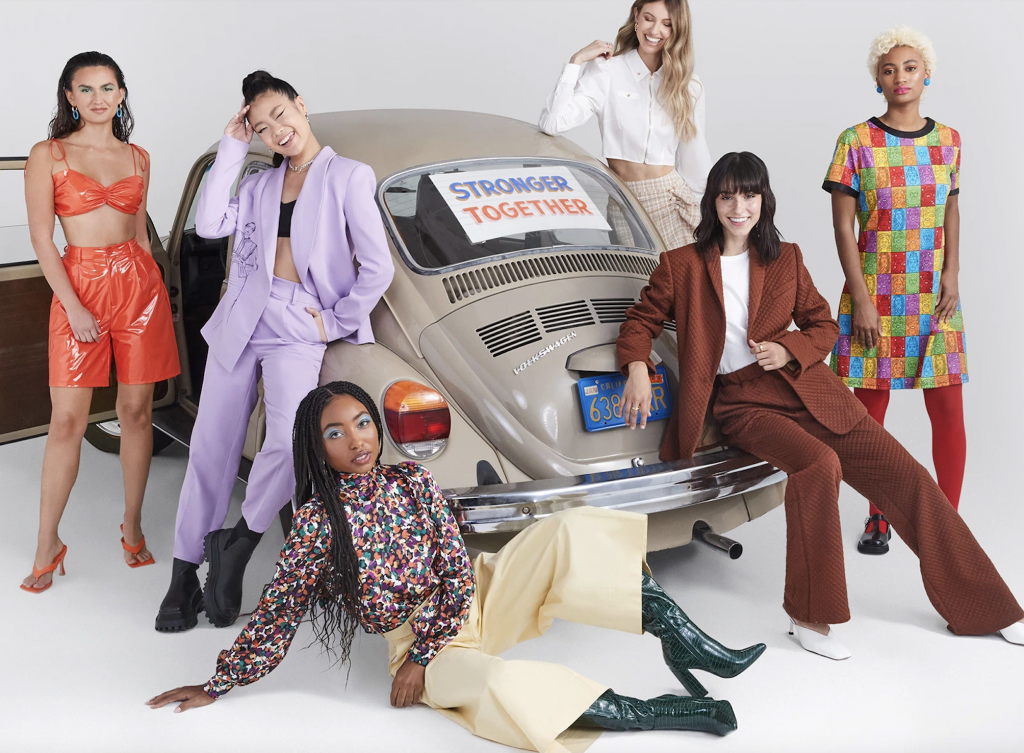Last month, Shein brought “Amazon’s 152-day streak as the most downloaded shopping app in the U.S.” to a halt, Bloomberg reported this week, in what it calls “a remarkable feat” for any budding clothing brand, “let alone one most Americans over 30 still have not heard of.” The rise of the Chinese fast-fashion retailer has been quiet, but impactful thanks in large part to its dirt-cheap prices and wildly-sped-up take on fast fashion, a model that sees garments and accessories plucked from runway shows and lookbooks – and in many cases, emerging designers’ Instagram accounts – and reproduced quickly and inexpensively for the masses.
Shein has turned the evolving practice of fast fashion on its head, regularly churning out eye-watering quantities of new items (it dropped some 6,239 new items on its app in a single day recently), while actively chasing its rivals to the bottom on the pricing front so much so that Bloomberg says that Shein is a one-stop-shop for essentially “anything you want at prices so low you can afford two (or 30)” of just about anything. This creates “a rush approximating freedom for most people, especially fiscally constrained teens,” per Bloomberg, and as a result, these young shoppers have helped to push the digitally-native company’s app to the stop of the download charts and to put its name in the number one spot on lists of the “most talked about” brands on YouTube and TikTok for 2020.
In furtherance of its steady climb to the top of the fast fashion totem pole, Shein – with its $11 dead-ringers for Cult Gaia’s hot-selling Serita dress, lookalike Marine Serre tops for $8, and its copycat versions of Gucci, Dior, and Bottega Veneta bags all for less than $30 – is not merely one of the most blatant appropriators of other brands’ wares, it is swiftly becoming one of the biggest. Shein reportedly generated “in excess of $10 billion” in revenue in 2020, per Forbes; for a point of comparison, fellow digital fast fashion brand Fashion Nova’s annual sales fall somewhere between $100 and $500 million, according to estimates. (Both Shein and Fashion Nova are privately owned.)

Beyond its sheer size and ever-growing popularity, Shein is a sticking point for brands because of how “quickly [it can] turn emerging fashion trends into extremely cheap products” thanks, in large part, to its use of data analytics, the Financial Times wrote this week. Emmy Hunt, a partner and trademark attorney at Potter Clarkson, echoed this sentiment, telling TFL that while fashion brands are “used to fighting on multiple fronts to protect their intellectual property, that challenge is only intensifying as major global players like Shein increasingly harness advanced data analytics to establish emerging fashion trends and rapidly create and produce associated designs that can be on the market within a matter of days.”
Shein’s ability to turn out perfectly on-trend wares at a fraction of the cost of its competitors has positioned the press-shy company at the forefront of the fast fashion market to such an extent that Chinese internet and tech innovation-focused writer Matthew Brennan says that it is “essentially defining its own category,” one that is ahead of the “ultra-fast fashion players” like Missguided, Fashion Nova, and Boohoo. This new space, as Brennan puts it, is even faster; it is “Real-Time Retail,” and it enables Shein – which got its start in 2008 under the watch of under-the-radar businessman Chris Xu – to be “so far ahead of its direct competitors that it is difficult to even compare them.”
Fast Fashion Legal Fights
One thing that Shein does have in common with its fellow fast fashion counterparts – no matter the speed and price at which they are bringing products to market – is the flurry of litigation that inevitably tends to erupt. Forever 21, for instance, regularly made headlines in its pre-bankruptcy heyday for slapping Gucci’s trademark-protected green-red-green stripe on apparel and accessories (and being sued for it) and for taking aim at the offerings of younger, smaller brands, and in at least some cases, being hauled into court as a result. The early fast fashion brand has also been sued by Mara Hoffman, Puma, adidas, H&M, and photographer Vanessa Boy, among others, on similar grounds.
In the same vein, United Kingdom-based ultra-fast fashion brand Missguided is no stranger to litigation. It was sued in 2019 for allegedly knocking off Kim Kardashian’s clothing and then using images of the mega-star to entice consumers, and is currently facing off against Sean “Diddy” Combs, who has accused it of “using and exploiting [his] name, image, likeness, and persona … without his approval, permission, or consent.” Meanwhile, Los Angeles-headquartered Fashion Nova has been sued by brands ranging from Versace (the case centers, in large part, on its copycat version of J.Lo’s famous 2000 Grammy’s dress) to Chrome Hearts, as well as Playboy and a celebrity photo agency thanks to its use of others’ imagery.
Now it is Shein’s turn to face the infringement music, and the lawsuits are slowly starting to pile up.

The Financial Times reported this week that Dr Martens-owner Airwair filed suit against Shein in a California federal court in late 2020. In the currently-pending case, the boot-maker claims that Shein is manufacturing and marketing counterfeit footwear. At the same time, court dockets in the U.S. show that the burgeoning fast fashion brand and/or corporate entity Zoetop Business Co. have been named in a number of trademark and copyright infringement lawsuits in recent years by big names like Levi’s and Ugg-owner Deckers Outdoor Corp. and indie creatives like Katie Thierjung and Kjersti Faret, with most of those suits following the traditional course and quietly settling out of court.
Most recently, Shein was named in a trademark infringement and unfair competition lawsuit by Ralph Lauren, with the American fashion brand accusing Zoetop Business Co. of offering up apparel that includes trademarks that are “substantially indistinguishable and/or confusingly similar to one or more of Ralph Lauren’s marks,” namely, its famous polo player logo. According to Ralph Lauren’s March 2021 complaint, Zoetop’s infringement is “willful, deliberate, and intended to confuse the public and to injure Ralph Lauren” and in an “effort to exploit Ralph Lauren’s goodwill and the reputation of genuine Ralph Lauren products” for its own gain.
Ralph Lauren is seeking injunctive relief and damages, and chances are, the parties will likely work out a deal behind the scenes and go their own ways long before trial, with any monetary settlement solidly serving as the cost of doing business in the fast fashion space just as it has for Shein’s predecessors. This principle is so well-known that Forever 21 was said to allocate funds in its budget each year not just to retain outside counsel and pay lawsuit-related legal fees, but to fund regular lawsuit settlements, as well, in order to deal with the many infringement suits – and/or pre-litigation squabbles and subsequent settlements – that its counsel seemingly expected to come its way.
Low Profile No More?
As for Shein’s notoriously low profile, which “is perhaps expected in times of geopolitical tensions and heightened regulatory scrutiny over China-related tech companies around the world,” as TechCrunch worded it last month, that is slowly starting to fade.
In addition to landing top marks on publicized charts, from app downloads to Gen-Z-mentioned brands, the company and its model – which sees it “own its sales channel and user data,” thereby, distinguishing it from “the swathe of generic consumer brands relying on Amazon for customer acquisition without meaningful access to user data” – is increasingly creeping into the broader collective consciousness. It has garnered attention from venture capital titans, with its latest round – a Series E – helping it to nab a reported valuation of $15 billion; the company counts Sequoia Capital and Tiger Global among its investors. And all the while, the company made headlines recently in connection with reported plans for an initial public offering, although it has denied a market float at this time.
As for whether we can expect more litigation to further lift the lid on the workings of Shein, it seems likely. While fashion designs, themselves, are relatively rarely protected in their entirely (although there are certainly exceptions, such as for the trademark-protected appearance of certain source-identifying handbags and/or footwear or design patent-covered ornamental appearances of designs, such as brands’ hot-selling or staple accessories), if the side-by-side images and the growing number of lawsuits wages against it are any indication, Shein is seemingly willing to replicate lookalike version’s of other brands’ marks and designs, and chances are, their protected prints and patterns, thereby, providing plenty of room for brands to potentially take action. Stay tuned.











